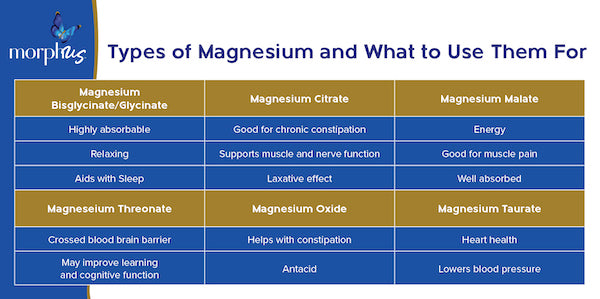Which Magnesium is Best During Menopause
By Andrea Donsky | Fact Checked | Sources

Of all the nutrients, magnesium may be the one that is most helpful during menopause. It’s not like this mineral doesn’t already have many other tasks to perform in the body. After all, magnesium is involved in about 300 different bodily processes. This fact makes it an important mineral to know about when you are living through perimenopause and menopause.
What is magnesium?
Magnesium is a mineral that can be found throughout the body. About 50 percent of the estimated 25 grams in the adult body are found in the skeleton, and the remaining grams are in muscle soft tissues, and bodily fluids.
Some of the functions performed by magnesium include maintaining healthy nerve and muscle function, protecting bones and teeth, and assisting with energy metabolism. Magnesium also can help ward off fatigue and help with insomnia.
Our Top Picks
Read about magnesium the most magnificent mineral
Why is magnesium important during perimenopause and menopause?
Several of the symptoms that occur during this transitional time of life can be managed well if you take magnesium as a supplement and/or include more foods that are rich in the mineral in your diet. If you are considering magnesium supplements, there are many different types, and each one has one or more qualities that can help with specific symptoms or concerns. Therefore, we will look at a few of the different types of magnesium and how they can help you navigate your way through perimenopause and menopause with as little hassle as possible.
Which types of magnesium are helpful during menopause?
Here are some types of magnesium and their qualities that can help you get through perimenopause and menopause.
- Magnesium bisglycinate: This combination of the amino acid glycine and magnesium may help with a variety of menopausal symptoms. Are you having trouble with insomnia, depression, stress, or anxiety? This supplement may provide some relief, although more research is needed. One double-blind, randomized study among older adults found that taking 500 mg magnesium daily for eight weeks results in significant improvements in sleep. This is the formulation Morphus uses in their Morphus Magnesium and Morphus Sleepus.
- Magnesium chloride: This combination of magnesium and chlorine can help manage digestion and gastrointestinal issues that can occur during menopause, such as heart burn and constipation.
- Magnesium citrate: Depression, sadness, and anxiety are common symptoms during this time of transition, but magnesium citrate may help. This magnesium supplement, which is a combination of the mineral with citric acid, also may help with constipation. It is easily absorbed by the body.
Read about do you need a magnesium supplement?
- Magnesium malate: This form of magnesium, which is well absorbed, is popular because it readily helps restore low magnesium levels. It is also gentle on the gastrointestinal tract.

- Magnesium orotate: For those who want to help protect their heart health during the menopause years, magnesium orotate may be a good choice. Magnesium is combined with orotic acid, which helps produce energy for the heart and blood vessels.
- Magnesium oxide: This combination of magnesium and oxygen is not well absorbed by the body, but it can be helpful in relieving digestive problems such as indigestion, heartburn, and constipation. Limited research suggests it may also help prevent and treat migraines, but more investigation is necessary.
- Magnesium sulfate: Also known as Epsom salt, this supplement is a combination of magnesium, sulfur, and oxygen. If you experience constipation, this supplement can help.
- Magnesium taurate: Blood sugar levels can be a concern during the menopausal years, but magnesium taurate may help regulate them. This supplement also has demonstrated some support of healthy blood pressure and therefore heart health.
- Magnesium threonate: Are you experiencing some difficulty with concentration, depression, or age-related memory loss? Then magnesium threonate (magnesium plus the mineral threonic acid) may help. More research is needed in this area.
Bottom line
Magnesium supplements come in various forms, but they all seem to have something in common: they can benefit symptoms associated with perimenopause and menopause. Each type of magnesium has some of its own special benefits, but if you can’t decide which one to choose, select from those that the body absorbs best, which are bisglycinate, citrate, chloride, and malate.
Explore the benefits of Morphus Magnesium:






